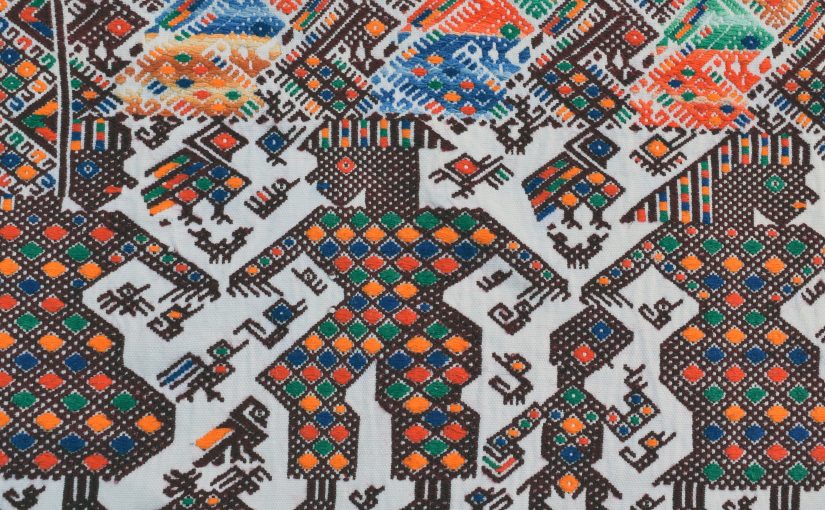In this unit you will learn how to ask questions. Next, we will take a look at how to construct negative sentences, which are a bit complex in K’iche’.
Le al We’l kusolij le a Xwan pa le ro’ch jela’ Nawalja’.
Manuela visits Juan at his house in Nahualá.
We’l: Saqarik a Xwan!
Xwan: Saqarik al We’l!
We’l: Chakuyu numak, la k’o le anan? K’o jun nutaqkil ruk’.
Xwan: K’olik. Kapetik ri’.
We’l: Maltyox!
Xwan: La k’o k’u le axb’al kamik?
We’l: Maj. Na petnaq taj.
We’l: Good morning, Juan!
Xwan: Good morning, Manuela!
We’l: Is your mom home? I have an errand with her.
Xwan: She is. She is coming.
We’l: Thanks!
Xwan: And your brother, is he home today?
We’l: He’s not. He didn’t come.
Yes/no questions in K’iche’
In K’iche’ yes/no questions simply require placing the particle La at the beginning as well as adding a raising intonation at the end. Listen carefully to the examples below.
-Je’, k’olik. |
-Is your dad (home)? -Yes, he is. |
The particle je’ is utilized as yes. As we have seen, the particle k’o becomes k’olik when it is in the phrase final position.
– Je’, xukulik. |
-Is Xwan kneeling? -Yes, he is. |
– Je’, oj oj nab’e. |
-Are we first? -Yes, we are first |
Please listen to the following examples and practice answering the questions.
– K’olik. OR: |
-Do you have a girlfriend/boyfriend? -I do.-Yes, I have a girlfriend/boyfriend. |
– Je’ nim. OR: |
-Is your town big? -Yes, (it is) big. -Yes, my town is big. |
– In k’olik. OR: |
-Are you with your dog? -I am. -Yes, I am with my dog. |
– Je’, rax. OR: |
-Is the mountain green? -Yes, (it is) green. -Yes, the mountain is green. |
– Je’, k’olik. OR: |
-Do you have your things? -Yes, I do. -Yes, I have my things. |
– Je’, wachalal. OR: |
-Is Manuela your relative? -Yes, (she is)my relative.-Yes, Manuela is my relative. |
– Je’ oj k’olik. OR: |
-Are y’all at the school? -Yes, we are.-Yes, we are at the school. |
Negation in non-verbal sentences
In Nahuala K’iche’, the negative answer to yes/no questions is maj. The Spanish loanword no’ (with a glottal stop) is often heard as well. An answer with maj alone may be interpreted as somewhat curt but sometimes it is enough. Negation in K’iche’ is periphrastic, in other words, it requires two negation markers as in French, for example. The first is the (optional) particle na preceding the predicate. The second (obligatory) particle is ta or taj in sentence final position. Negative existential sentences in Nahuala start with maj and do not carry the existential k’o/k’olik. Let’s look at some examples:
Negation big Negation its-leg this tree
This pine (tree) is not tall.
(Remember the construction nim raqan means tall)
Neg. green neg. its-face art. mountain
The mountain is not green.
Neg. his/her-money art. drunk (person)
The drunk (person) has no money.
Neg. good neg. art. her-sewing art. class. Mari’y
Maria’s sewing is not good.
Neg. yellow neg. its-face art. our-banana
Our banana is not ripe (yellow).
Neg. rain today
There is no rain today.
Neg. sun rays yesterday
There was no sun today.
| sak’aj | smart, bright |
| k’ax | difficult |
| chaq’ | younger sibling of the same sex |
| chwe’q | tomorrow |
| iwir | yesterday |
| kamik | today |
| chanim | right now |
| jab’ | rain |
| uwaq’ij | sun rays |
| prut | banana |
| q’abarel | drunk (person) |
| t’iso’m | sewing |
| jastaq | things |
| -achalal | family relative |
From the following word pairs, form questions indicating possession and answer them in the affirmative and in the negative.
Example : at/ixoqil : La k’o awixoqil ? –Je’, k’olik. /Maj. -Do you have a wife? Yes, I do./ No, (I do not).
- At/wuj
- Al Nela/chak/pa tijob’al
- At/ xajab’
- Nan Xe’p/po’t
- A Si’s, al Xe’p/xajab’
- At/chak
- Ajtij/chakub’al/pa Nahualja’
- Ix/pwaq
- Tz’i’/wa
- B’i/tz’i’
- At/chaq’
Now, practice asking and answering the following questions in k’iche:
- Are you in the United States?
- Do you (plural) have a dog?
- Xwan, is your younger brother home?
- Is your dad a lumberjack?
- Are you drunk?
- Is the mayor in his office?
- Are we smart at school?
- Is the k’iche’ class difficult?
- What’s your name (addressing an elder)?
- Is Mari’y’s huipil green?

